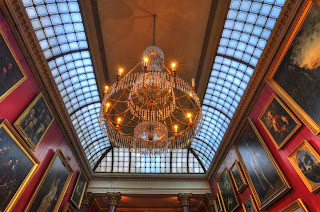There are some great interior shots and photos of some of Attingham's collection here on the Treasure Hunt Blog.
Friday, September 21, 2012
The Great Country Estates of Britain Series: Attingham Park...
During some recent research for Willowbrook I came across a country house I hadn't heard of before: Attingham Park. It is a country estate near Atcham, Shropshire.
Built near the site of Tern Hall (demolished in 1856), it is where the confluences of the rivers Severn and Tern meet. The land was bought in 1700, and originally belonged to Haughmond Abbey, which was abolished under Henry the VIIIs dissolution of the monasteries.
Little is known about Steuart. His first commission was a house in Grosvenor Place, London for the 3rd Duke of Atholl
in 1770. Any knowledge of his career then becomes murky until 1779, when he designed Onslow Hall in Shropshire. Lord Berwick first employed him to
decorate his London house, and then Attingham around 1782. The grade one listed building as it stands however, was not as per Steuart's original design...
When the 1st Baron died, the second Baron, Thomas Hall, commissioned John Nash to remodel Attingham to reflect the evolving Regency / Palladian style (Ca. 1805). The remodelling also allowed for Thomas' art collection acquired during his grand tour, even including a skylined gallery for the paintings...
Picture from the Attingham Blog
The Park was landscaped by Humphry Repton (the last great English Landscape Gardener of the 18th century). At its height the estate comprised 8000 acres, but half of that was sold off in the early 20th century.
Above: One can see the river Tern flowing through the middle of the park.
Above: Humphry Repton
Repton had no real horticultural experience, but was a staunch defender of Capability Brown, and armed with determination he became an overnight success. He sent flyers to all his aristocratic friends advertising his services, and became famous for his red leather bound books which he gave to clients, to show plans with successive translucent overlays so that clients could see his visions evolve before their eyes (and show them to all their friends)...
Some examples of his overlay work in a red book...
(First two examples from Citizenart, Last 2 examples from Architessica)
You can find a complete example of his red book for Witton (Home of Baron Wodehouse) here.
Repton's first paid commission was Catton Park in 1788. At the height of his career he design the gardens for Woburn Abbey and Stoneleigh abbey. The Duke of Bedford was so pleased with Woburn that he commissioned him to deign the gardens for Russell square in London (Bedford owned huge areas of land in London until the title passed last century). He was just pipped at the post by Nash for the commission to build the Royal Pavilion at Brighton.
Repton's Business card...
The Title of Baron of Berwick died out in 1953 with the 9th Baron. About half of the Barons of Berwick died childless or were never married. The property is now managed by The National Trust.
Above Photo: Phil Delfryn
The park first hosted the summer school for the Attingham Trust, an organisation set up to support and educate those involved in studying, maintaining and curating the collections of the great county houses and royal palaces of the UK.
There are some great interior shots and photos of some of Attingham's collection here on the Treasure Hunt Blog.
Subscribe to:
Post Comments (Atom)









.JPG)




































































We had the pleasure of visiting Attingham Park last summer. It is a lovely house. One can only visit on a guided tour, a thing we normally shy away from, preferring to visit on our own at our own pace, however the guide we had was perfect, dressed in period costume and a real pleasure to listen to. My favourite room was the Drawing Room with the Octagon Room coming a close second. The Dining Room was magnificent and I recall that they had a series of paintings of various from among their farm animals.
ReplyDeleteAttingham is a restoration project in progress and well worth a visit.
By for now,
Kirk